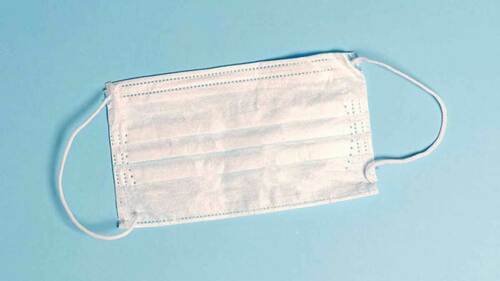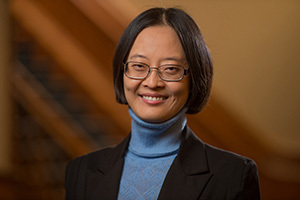
Members of the University of Notre Dame community with connections to China, including students, parents of students, alumni, faculty and staff, have donated nearly $40,000 toward the coronavirus response in St. Joseph County — specifically for personal protective equipment (PPE) for health workers and others who may come into close contact with the virus.
The equipment, from China, includes face masks and protective suits for St. Joseph County Unified Command (SJCUC), which is responsible for coordinating the coronavirus response with local governments, hospitals, nursing homes and other public and private stakeholders in St. Joseph County.
Parents and alumni in China are helping to source the goods and to ensure they meet U.S. manufacturing, health and safety standards. The first shipment of about 10,000 masks will arrive in South Bend in the coming days.
The bulk of the nearly $40,000 was donated by the parents of Chinese students who remain on campus despite suspended in-person classes and closed dorms because of ongoing travel and re-entry restrictions in the U.S. and China.
Those students, and others who cannot return home because of the virus, were relocated to a single location on campus, outside of the dorms, after spring break.

“I’m really impressed, and deeply, deeply touched, by our community in China,” said Miranda Ma, senior advisor for Asia with Notre Dame International and a native of China. “I’m really grateful that they’ve been able to support our community the way that they have.”
As for the students and alumni, Ma said, “This shows how grateful they are for receiving an education from Notre Dame. This is the time to return all the kindness and support the University has given them.”
Ma is among about two dozen students, faculty, staff, alumni and parents involved in the effort. Others include Liang Cai, assistant professor of history at Notre Dame, and Jingyu Wang, executive director of the Notre Dame Beijing Global Gateway. The group is organized under the name “Notre Dame Chinese Volunteering Group.” Members communicate via WeChat, a Chinese messaging app.
Ma said members of the overseas Chinese community are uniquely qualified to respond to the need for personal protective equipment in the U.S., having responded to the same need in China at the start of the outbreak.
“We helped our community in China in January and February, so we have experience in purchasing supplies, clearing customs,” Ma said. “Now, we want to use that experience to help our community here. To help our friends and family. To help the people we love.”
The group previously placed a donation box for PPE on campus with the message ‘A mission to provide stellar education; A spirit to radiate love and care,’ resulting in thousands of masks, gloves and wipes, as well as hand sanitizer, for SJCUF, Memorial Hospital of South Bend and Notre Dame itself.
Ma thinks of it in terms of sport.
“It’s like a game,” she said. “The first half of the game was in China, and the second half is taking place in the rest of the world. For the overseas Chinese community, we’re fighting both the first half and the second half.”
Betty Qi, a senior psychology major from Shenzhen, China, is among the student members of the group.
“This is an extremely difficult and dark time, and it is only through mutual support that we can all survive with love and appreciation in mind,” said Qi, who is currently living off-campus in South Bend.
Qi previously coordinated donations of PPE to China as part of the Chicago-ND Volunteering Group, which she co-established with fellow Notre Dame students as well as alumni from the Chicago area.
The group raised more than $20,000 for PPE for hospitals in Wuhan and Hubei, and built an ecosystem for connecting Midwest schools and organizations, donors, volunteer groups, distributors, transporters and hospitals around the virus.
The group later collaborated with the Chinese Trading and Investment Association, a Chicago-based NGO, to procure more than 2,000 goggles, more than 10,000 protective suits and 50,000 masks for more than 50 hospitals in Hubei.
Qi said her experience with the Chicago-ND Volunteer Group, especially the support of the Notre Dame community, encouraged her to join the Notre Dame Chinese Volunteering Group, for which she’s mostly been sourcing and screening supplies, outlining procurement processes and coordinating the collection of donations on campus.
“So many faculty and students reached out to us, sharing resources and words of encouragement,” Qi said of that earlier experience. “I really appreciated that, and believe this is the time when I should express my gratitude and give back to the community.”
Ma and Qi both said their families in China are safe and healthy.
PPE, including masks, gowns, gloves and face shields, is critical for preventing the spread of the coronavirus in hospitals and other health settings, as well as among police fire and emergency medical personnel, but has been in short supply since the start of the outbreak.
In the absence of a timely market or government response to the problem, and with hospitals increasingly rationing it, doctors, nurses and other medical personnel have resorted to buying masks and other equipment online or from local stores, or using it longer than recommended for safe use.
At the same time, businesses, organizations and individuals have started donating equipment, including homemade and store-bought masks and face shields, to hospitals, nursing homes and other such facilities, as well as police, fire and emergency medical personnel, representing an unprecedented mobilization of grassroots, community support for health care workers.
Notre Dame, for its part, has donated thousands of masks, gloves and other PPE to SJCUC from labs across campus. The University also helped produce a coronavirus PSA for local television and radio stations on behalf of the county health department. And it is 3D-printing hundreds of face shields for local health workers.
Ma said her motivation for assisting with the coronavirus response here is simple: a genuine concern for others and the broader community. It is not a response to escalating anti-Asian discrimination around the virus in the U.S. and elsewhere, she said, though that is a concern.
“No matter where you are, no matter which country you’re from, we are global citizens,” Ma said. “You are responsible for what is happening around you. You try to do good things, and if that happens to enhance the Chinese community’s reputation, that’s a good thing.”
Qi agreed.
“I hope this provides an opportunity for introductory conversations between our Asian members and the rest of the community,” said Qi, who in addition to her regular studies is an undergraduate research assistant with the Babies and Families Lab, an off-campus research program of Julie M. Braungart-Rieker, the Mary Hesburgh Flaherty and James F. Flaherty III College Chair and professor of psychology at Notre Dame. “It’s important to let our voice be heard, and make everybody realize that we deeply care about the wellbeing of the whole community.”
Contact: Erin Blasko, assistant director of media relations, 574-631-4127, eblasko@nd.edu